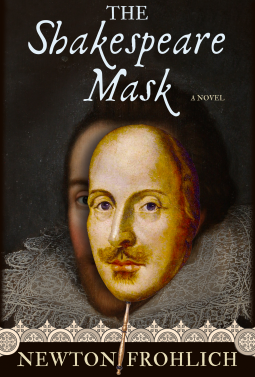
The Shakespeare Mask
by Newton Frohlich
This title was previously available on NetGalley and is now archived.
Send NetGalley books directly to your Kindle or Kindle app
1
To read on a Kindle or Kindle app, please add kindle@netgalley.com as an approved email address to receive files in your Amazon account. Click here for step-by-step instructions.
2
Also find your Kindle email address within your Amazon account, and enter it here.
Pub Date Jul 25 2014 | Archive Date Jan 31 2015
Blue Bird Press | The Editorial Department
Description
“Truth is subject to no prescription, for truth is truth though never so old, and time cannot make that false which was truth.” – Edward de Vere, 17th Earl of Oxford
In the sixteenth century, a precocious young nobleman draws the attention of the Elizabethan court- and of The Virgin Queen herself. A writer and patron of the arts, Edward de Vere is volatile, controversial- and brilliant. He leaves a trail of women and scandal in his wake. But his plays, when he’s in the queen’s good graces, charm the court.
Yet the rules of the court say a nobleman may not publish. An earl’s name is too sacred for the theater. If De Vere must write, he must do so anonymously, and employ a runner, an almost illiterate cobbler’s son from Stratford, to claim his words.
Newton Frohlich, an attorney and the author of the celebrated historical novel 1492, spent fifteen years researching unexplored questions about the poet and playwright we today know as Shakespeare. His is an intimate tour of English castles, Venetian canals, and a complex man who penned the most beloved works of the English language.
Advance Praise
No Advance Praise Available
No Advance Praise Available
Marketing Plan
No Marketing Info Available
No Marketing Info Available
Available Editions
| EDITION | Other Format |
| ISBN | 9780996048415 |
| PRICE | $3.99 (USD) |
Links
Average rating from 23 members
Featured Reviews
 Kelli K, Librarian
Kelli K, Librarian
I really enjoyed this book. I know that there are a lot of theories out there that William Shakespeare was just a pen name, but I feel that this one made the most sense to me. I would recommend this book to anyone, but most especially to those who enjoy the Elizabethan era and Shakespeare.
 Meagan N, Educator
Meagan N, Educator
Interesting and in-depth look at a controversial topic! As a great Shakespeare lover, I wasn't sure I'd enjoy this book sat all, but Mr. Frohlich doesn't present an argument, rather weaves a story that entertained, questioned, and caused me to think deeply. I'd love to use this as part of a research/debate with my students!
 Reviewer 181627
Reviewer 181627
In a time of darkness, intolerance and political and religious strife one young man's mind emerges to question and examine forgotten literature of bygone eras, to encourage others into the artistic enlightenment and golden era of reformation and discovery. This extraordinary mind will create some of history's most profound, perceptive and beautiful plays, sonnets, poems and lines of dialogue the world has ever known. History will have us remembering the name associated with the mind as William Shakespeare. But who was William Shakespeare or it is possible to ask who wrote for Shakespeare? Scholars, celebrated authors and alternative enthusiasts all have different theories and the potential reader could happily lose themselves for hours revisiting others ideas and come to the conclusion that the real identity of the bard is one of history's most enduring mysteries, the mystique of the name that is forged from the unknown and the anonymity that has shadowed portraits and markers is only half of the entertainment to do with anything Shakespeare. And with that said, may I introduce The Shakespeare Mask by Newton Frohlich, a compelling dramatization that puts a face and name to that entertaining anonymity.
Whether or not the potential reader is familiar with the Oxford theory only encourages further study and examination after the reader finishes The Shakespeare Mask. Mr. Frohlich has brought the name of Edward de Vere, 17th Earl of Oxford out of the shadows of history and into a fictional dramatization that presses the questions and excitement of alternatives minds. The reader will follow Edward de Vere as he quests for knowledge and his many pursuits to international enlightenment and physical interests as his perceptive mind gathers material for the many works that will be later put under the name of William Shakespeare. Whether or not the reader believes that Edward de Vere was the writer for William Shakespeare matters little because The Shakespeare Mask invites the reader to question and examine the evidence that the author has set to this historically detailed and fictionalized story of the Earl of Oxford. The Shakespeare Mask continues to capture the Earl's journey and brings in his role in Queen Elizabeth's court and the complicated relationships with advisors and the Virgin Queen herself. As the pages turn the reader is given facts and then explanations set in the pages that only drives the mystery and theory. The appearance of the "mask" is not made until almost the end along with the offer of a simple exchange that will eventually erase Edward de Vere, 17th Earl of Oxford from portraits and markers and commence the immortality of the name of William Shakespeare. The parting notes gather further evidence and if the potential reader is interested these include several more books that support the questions: who was William Shakespeare or who actually wrote for Shakespeare?
In the end, The Shakespeare Mask was a great escape for this reader. I believe I missed the 2011 Anonymous mania and the other day was the first time I heard the name of Edward de Vere. The Shakespeare Mask captured my interest as soon as I read the synopsis and thought was it really possible? This immediately became a must read for me and I closed the pages late last night really questioning the possibility that Edward de Vere, the 17th Earl of Oxford could have been the brilliant mind behind all those works. It depends on the reader if they will be more interested in the possibility and enjoy the facts set to a dramatization or read it for their interest in the 16th and the mention of the early 17th century, either way Mr. Frohlich knows how to weave a story, spark the curiosity of his audience and their desire to learn more.
*I would like to thank Blue Bird Press and NetGalley for the opportunity to read and enjoy The Shakespeare Mask
 Laura K, Bookseller
Laura K, Bookseller
This started slowly, but quickly picked up the pace. I would have liked for the book to be a bit longer, so that we could spend some more time with these fascinating characters, and the story could have a bit more room to breathe. By the end, I found Edward quite engaging and sympathetic.
 Peter W, Reviewer
Peter W, Reviewer
This was one of my favorite books in the past year. The author has a well researched and clear position on Shakespeare that he brought forward in a moving and detailed story. I recommend it to everyone.











